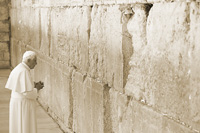By Joel Magalnick, Editor, JTNews
When Pope Benedict XVI visited Israel in May, he did so with lofty goals and his own history that has kept many Jews on edge about his intentions.
Yet where many Jews question his motives, Rabbi Gary Greenebaum, the national director of inter-religious affairs for the American Jewish Committee, said that after nearly two millennia of antagonism toward Jews, that two popes in the space of 15 years visited Israel with the intent of seeking to better relations between the two peoples is a lightning-quick development for the slow-moving Catholic Church.
“I think the Jews need to understand there are a thousand places he could have gone,” Greenebaum said. “He wanted to go to the Holy Land as a pope. He wanted to interact with the Jews and with the Muslims there, and he didn’t need to do it.”
Which isn’t to say there weren’t missteps.
“The Israelis took him to task for not mentioning Germany, for not mentioning Nazis…not mentioning responsibility of people in the Church,” Greenebaum said. “His handlers basically said, ‘Well, he talked about all those things before, you can’t talk about everything every time,’ and that’s true. But when you go to certain places, representing certain things and certain institutions, there are certain things you have to do. So when a German pope goes to Yad Vashem, you have to mention Germany, you have to mention Nazis. You just have to.”
Still, Greenebaum said, Pope Benedict accomplished what he wanted to do, even if the trip did not leave as strong an imprint as his predecessor, John Paul II, who had won over the Israeli population with his natural warmth.
“This pope is a theologian, he was a professor,” Greenebaum said. “He needs to understand who the Jews are in a way that John Paul II embraced his friends and his family. It’s different.”
What marred this pope’s Israel pilgrimage from the start was his effort to bring four excommunicated bishops back into the fold, including one that has a history of Holocaust denial. The decision to bring back of these bishops was, Greenebaum said, an issue of bad staffing — so much so that the pope wrote to dioceses around the world to apologize.
“The Holy Father, without having done the necessary research on that, as he wrote to us in a letter to all the bishops, really got blindsided by this thing,” Rev. Alexander Brunett, archbishop of Seattle, told JTNews. “He actually did the most unprecedented thing I’d known about since I’ve been a bishop or in this position, [which] was to write a…letter to all the bishops in the world, and explain what happened.”
Where the pope had been thinking the issue was one of liturgy disunity in the church — these bishops had been ordained by Bishop Marcel Lefebvre, who had rejected the teachings of Vatican II, the document that had paved the way for Jewish-Catholic relations and created a breakaway sect of the church — what the situation became instead was one of acceptance of the Jews in the Catholic religion.
The three other priests being called back into unity were not much better, Greenebaum said, and what most Jews don’t understand is that their admittance back into the church is not instantaneous — it could be a lifetime before they fulfill all the requirements asked of them.
“This created a possibility for them to work their way back in, but there were all kinds of guidelines and rules and regulations that they would have to adhere to in order for them to change their relationship to the church,” Greenebaum said.
Greenebaum suggested that the pope’s need to have unity in the church, and an academic’s understanding of the Church’s theology, may have caused so much of the misunderstanding between the Church and the Jewish community.
“When he changed the Tridentine prayer himself — he finally rewrote it himself — it remained an ambiguous prayer, and the Jews were not happy with it…because it suggests an end-of-times scenario where it’s not clear whether Jews will be saved through their own covenant or Jews will be saved somehow through the agency of Christ brought into play in a way we don’t understand,” Greenebaum said. “But what Jews don’t stop to think about is, when did a pope write a prayer? That’s pretty extraordinary.”
It’s because of the trouble he has with his own past, as an involuntary member of the Hitler Youth, that Pope Benedict has gone to such lengths to let Jews know that such issues matter to him.
“Jews think, ‘Oh, he doesn’t care, he doesn’t think, he doesn’t think about the Jews,’” Greenebaum said. “That’s really wrong. He thinks about it deeply and a lot.”
Archbishop Brunett said he too believes the pope is very troubled by his past and has gone to pains to make retribution for anything he may have done.
“Benedict XVI visited a synagogue in Cologne, Germany,” Brunett said. “The synagogue’s rabbi said, ‘My mother, who died in Auschwitz, would never believe that her son would greet a German pope visiting her synagogue destroyed during the second World War and then rebuilt’ — [it’s] kind of a touching story.”
